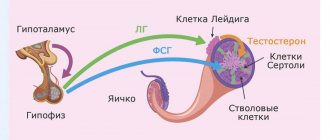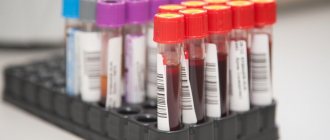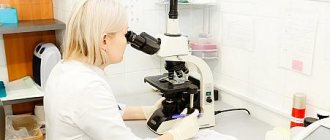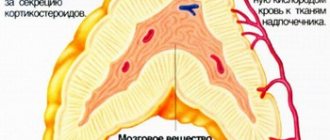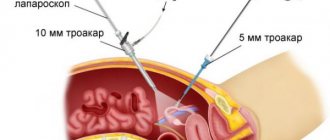5 tests. that cannot be taken 8 tests that can be taken (but you need to be careful) Is it possible to donate blood during menstruation for biochemistry Is it possible to donate urine during menstruation Tests that can and should be taken (by week of the cycle) 3 hormonal tests that are not affected by menstruation
The doctor recommended laboratory tests, but menstruation began - a situation familiar to most women. Is it possible to take tests during menstruation or should I postpone them? Regular bleeding is not a contraindication for most “routine” studies. But there are factors that need to be taken into account (especially when it comes to reproductive health). Let’s figure out which tests cannot be taken during menstruation, and which ones can and should be done.
It is necessary to tell the doctor about menstruation: this will help to correctly decipher the results, make the correct diagnosis and prescribe appropriate treatment.
Changes in blood composition during menstruation
During menstruation (menarche), the upper layer of the endometrium of the uterus is shed. This leads to bleeding from the woman's genital tract. The following changes occur in the peripheral blood:
- an increase in ESR, which is a marker of inflammation; this is considered normal during menstruation;
- reducing the number of platelets and clotting factors, this is necessary to reduce the viscosity of biological fluid and prevent the formation of clots;
- decrease in the number of leukocytes;
- decrease in the amount of hemoglobin and red blood cells due to blood loss;
- changes in hormone ratios;
- decreased plasma levels.
Important! All changes occur within normal limits; in a healthy woman they do not affect or slightly change the state of health. Losses are quickly replenished after menstruation ends.
Recommendations for donating blood
To undergo laboratory tests, you must follow the recommendations of your doctors. They will help to obtain reliable data in one study.
- You should not eat food 12 hours before testing. During the day - drink alcohol. 2-3 hours before - smoking.
- Laboratory tests are carried out only in the morning, with the exception of hormonal studies.
- Stop taking medications 5 days before donating biological fluid. If this causes a sharp deterioration in health, the drug is not discontinued, but the doctor is warned about it.
- It is not recommended for women to take tests on menstruation days, as the data will not be reliable.
For donation, recommendations are supplemented. Biological fluid cannot be given to persons under the age of majority, pregnant women, lactating women, infectious patients, people with addiction (alcohol, drugs).
PREPARATION FOR TESTING
Full range of laboratory tests at the MEDTEST clinic. In our clinical diagnostic laboratory, patients can do the following tests:
- Clinical blood test: general, ESR, leukocytes, hemoglobin.
- Advanced and biochemical blood test, coagulogram.
- Analysis for blood group, Rh factor, HIV infection, antibodies.
- For hormones of the thyroid and pancreas, adrenal glands, reproductive system.
- For tumor markers.
- Microscopic examination of gynecological smears, cytological material.
- Spermogram and analysis of prostate secretions.
- Urinalysis: general, protein, bacteria.
- Stool analysis for worm eggs, traces of blood, dysbacteriosis.
You can get tested in Stary Oskol by receiving a referral from a therapist or specialist. Our medical center sees one of its main tasks in carrying out preventive measures: we offer individual examination programs for people of different age groups, men and women, and also conduct annual medical examinations.
Preparing for analyzes and conducting laboratory tests
If you have made an appointment and are preparing to undergo medical tests, please read the recommendations and rules on the clinic’s website. Only if they are followed is the information content and reliability of the study guaranteed, which is extremely important when making a diagnosis and further selection of medications.
- If you need to take a blood test, plan the test for the morning.
- Please note that some tests require dietary restrictions.
- Women donate blood for hormones on a certain day of the cycle - on the recommendation of a doctor.
- In a comprehensive diagnosis, tests are first performed and only after them are ultrasound, cardiogram and other procedures performed.
We care about the maximum convenience of our patients - appointments are conducted without queues, and material collection is carried out daily, in comfortable conditions. We will relieve young patients from possible stress and help older patients; you can call a nurse to your home to donate blood for a general and clinical analysis.
Make an appointment at the diagnostic
In our clinic you can take all tests at reasonable prices and undergo a full range of diagnostic procedures at a time convenient for you. Registration is carried out by phone and online, as well as by calling a specialist to your home. The laboratory of the medical diagnostic center employs highly qualified specialists and doctors of the highest category, which guarantees the rapid receipt of reliable and informative research results, which allows you to select an individual, highly effective treatment program.
Is it possible to donate blood during menstruation?
During menarche, changes in peripheral blood and hormonal balance occur. Some women experience severe abdominal pain, during which they use painkillers, the presence of which is contraindicated during donation, but is allowed for research of biological fluid.
When taking tests that are not recommended during menstruation, false positive results may occur:
- the presence of inflammation (increased ESR);
- hypoglycemia (low blood sugar);
- insufficiency of the immune system (decreased leukocytes);
- anemia (decrease in red blood cells and hemoglobin);
- decreased level of clotting, which occurs with infections, blood diseases (hemophilia).
A doctor may miss the following diseases due to false negative data:
- increased coagulability, which indicates a tendency to form clots and the risk of thrombosis and heart attacks;
- oncological diseases;
- allergies to foods, medications, herbs;
- liver pathologies (decreased bilirubin).
Why you shouldn't donate blood during your period
There are laboratory tests that will show erroneous results if done during your period. They are presented in the table.
| Analysis | Erroneous data |
| General clinical blood test (CBC) | Increase in ESR; decrease in platelets, leukocytes, red blood cells and hemoglobin |
| Biochemistry | Minor changes in the amount of bilirubin, enzymes, protein |
| Tumor markers | False positive or negative result due to hormone surge |
| Clotting factors | The total number of factors decreases sharply. The amount of D-dimer (an indicator of the risk of thrombosis) is greatly overestimated |
| Glucose | Reducing sugar levels |
| Allergy tests | False negative results due to decreased sensitivity of the body to irritants |
| Immunogram | Decrease in the number of lymphocytes, leukocytes, immunoglobulins |
Important! Menstruation is a contraindication for blood donation. The procedure leads to a deterioration in health.
After the procedure, a woman will experience:
- dizziness due to decreased blood pressure and blood sugar;
- nausea, which can turn into vomiting, which will further reduce the amount of fluid in the body;
- sudden loss of strength;
- dehydration due to lack of plasma;
- decreased body temperature, chills.
During menarche, a small amount of intravascular fluid is lost. If blood loss increases, it affects the body. An additional contraindication for donation during menstruation is the use of medications by a woman (painkillers, hormonal drugs in case of cycle failure). There are exceptions in the form of emergency donation, which will help save a person’s life.
Biochemical blood test:
Urea, uric acid
2-3 days before the test, it is recommended to stop eating liver and kidneys and limit meat, fish, coffee, and tea in your diet as much as possible.
Cholesterol, triglycerides, high-density lipoproteins and low-density lipoproteins
- The test is taken strictly on an empty stomach (12-14 hours of fasting).
- 1-2 days before the proposed test, do not eat fatty or fried foods.
- 2 weeks before the study, you must stop taking medications that lower blood lipid levels (strictly in consultation with your doctor).
Glucose
Strictly on an empty stomach (12-14 hours of fasting). Avoid drinking any drinks other than pure water. In the morning, avoid taking contraceptives and diuretics (in consultation with your doctor).
Glucose tolerance test (GTT)
- During the 3 days preceding the day of the glucose tolerance test, you must adhere to your normal diet without restricting carbohydrates (at least 150 g of carbohydrates per day).
- The last meal must also contain 30-50 g of carbohydrates.
- Avoid intense physical activity for 12 hours before starting the test.
- Medicines should be taken after the test.
- During the GTT, two or three blood samples are taken.
1st sample
- Strictly on an empty stomach (after 12 hours of overnight fasting, but not more than 16 hours).
- During testing, you can only consume water (not carbonated) up to 300 ml.
- Avoid eating, smoking, limit physical activity as much as possible (you can’t actively walk, you need to stay close to the place where the test is being performed).
It is very important to adhere to these recommendations, since only in this case will reliable results be obtained!
2nd and 3rd samples
- Within 2-5 minutes, drink 75 g of anhydrous glucose (standard packaging), diluted in 250-300 ml of warm (37-40 ° C) drinking still (or distilled) water. Glucose is given in the blood collection room.
- 1 hour after taking glucose, blood is taken again to test glucose levels
- 2 hours after taking glucose, blood is also drawn to determine glucose levels.
Permitted blood tests
There are laboratory tests where you can donate blood during your period. The presence of hormones is used to judge a woman’s ability to conceive, the health of her reproductive system, and the presence of ovulation.
- Luteinizing hormone stimulates the formation of estrogen, which causes ovulation. The study is carried out in the middle of the cycle.
- Prolactin is responsible for the occurrence of lactation. The analysis is carried out at different times of the cycle at the same time of day.
- Follicle-stimulating hormone - is found in different concentrations depending on the phase of the cycle. The maximum peak occurs during ovulation. Examine several times during the month.
- Estradiol - determines the reproductive function of a woman. If it is disturbed, additional uterine bleeding appears. The analysis is carried out several times per cycle.
In addition to studying hormones, other tests are allowed that will not give false results:
- blood type, Rh factor (these data are constant throughout life);
- PCR - determines the exact number of pathogenic microorganisms, their variety (their number does not depend on the formed elements and plasma);
- serology - testing that determines the presence of viruses in biological fluid;
- analysis for HIV, AIDS, syphilis, tuberculosis.
Tests that can and should be taken
Is it possible to test for hormones during menstruation? This period is the ideal time for tests on female hormonal status. During the period of regulation, the concentration of hormones most often reaches peak values and their study provides the most objective picture of the general situation.
This is especially important when treating gynecological diseases or reproductive problems. Here you should completely and completely trust the recommendations of your doctor and come within a strictly defined “window” of the cycle. In general, you can focus on the following dates.
End of the first week of menstruation
- Estrogens. They ensure the normal functioning of the female reproductive system, and their level fluctuates greatly depending on the phase of the cycle.
- Follicle-stimulating hormone (FSH), which controls the growth and maturation of follicles in the ovaries, also changes its concentration significantly depending on the day of the cycle. As a rule, its level is best determined 3-5 days from the start of menstruation.
- Luteinizing hormone, which stimulates the secretion of estrogens and progesterones and directly affects ovulation. Its level is extremely important in the treatment of infertility and, in particular, during in vitro fertilization procedures - for hormonal therapy to induce ovulation.
End of the third week of the cycle (regardless of the onset of menstruation)
- progesterone.
How long after menstruation can you donate blood?
For each laboratory test, there are restrictions for women to donate blood. In order for the studies to show reliable results and not have to repeat the testing, you need to know about the recommended time of the cycle phase for taking the tests presented in the table.
| Analysis | Cycle phase |
| UAC | Middle (12-16 days) |
| Biochemistry | From 10 to 20 days |
| Clotting factors | Middle (12-16 days) |
| Glucose | 3 days before menstruation and 7 days after it |
| Tumor markers | 5 days before menstruation and 7 days after it |
| Allergy tests | 5 days before menstruation and 7 days after it |
| Immunogram | 5 days before menstruation and 7 days after it |
Donation is carried out 5 days before menarche and 7 days after their end. These days, the body is not preparing for the endometrium, the amount of hormones is stable and does not affect the body. After the end of menstruation (about 7 days from its start), the intravascular fluid is restored, the number of formed elements stabilizes. The time period before menarche (5 days) is indicated so that the body can prepare for endometrial rejection without unnecessary stress on the body.
Is it possible to donate urine during menstruation?
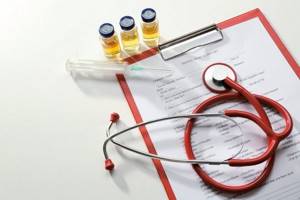
“These days” will not affect the indicators (as well as the fecal indicators). But the purity of the collection must be observed: if menstrual blood does not enter the sample for laboratory testing, the result will be accurate. To obtain objective data, it is enough to use a tampon and carry out normal hygiene procedures.
Consequences of donating during menstruation
In addition to the disruption to a woman's physical condition when donating during menarche, there are additional health risks. The following negative processes may occur:
- menstrual irregularities (failure, delay, premature onset);
- changes in hormone levels due to stress on the body;
- scarcity of biological fluid secretions during menstruation due to a decrease in the amount of plasma;
- reducing the body's resistance to pathogenic microorganisms.
Is it possible to donate plasma during menstruation?
To donate plasma, whole blood is taken from the patient. It is filtered in a medical device, and the formed elements (platelets and red blood cells + saline) are returned back inside the vessels located on the other arm. Up to 12 procedures per year are allowed. Plasma is restored faster than formed elements. Its amount depends on the fluid consumed.
Regardless of the fact that the amount of plasma quickly returns to normal, doctors do not advise donating it during menarche due to the following risks:
- a sharp decrease in the amount of plasma, leading to blockage of blood vessels with a thrombus or atherosclerotic plaque;
- a sharp decrease in blood pressure;
- deterioration of the patient's well-being.
The timing for donating plasma is 3 days before menarche and 10 days after, when the amount of fluid returns to normal. It is recommended to drink plenty of water to help this process go faster.
Blood tests
- If possible, it is recommended to donate blood in the morning, on an empty stomach. If necessary, you can donate blood during the day, no earlier than 3 hours after eating.
- It is not recommended to consume fatty foods and alcohol 1-2 days before the test.
- It is recommended to limit physical activity, hypothermia and overheating as much as possible.
- Avoid physical and emotional stress and smoking 1 hour before the test.
- On the day of the study, 2-3 hours before the procedure, drinking regimen: only water in the usual volume, you cannot drink tea, coffee, juice and other drinks.
- On the day of the study, medication intake must be agreed with the attending physician.
- You cannot donate blood immediately after physiotherapeutic procedures, instrumental examination, X-ray and ultrasound examinations, massage and other medical procedures.
- General rules apply to all tests, but some tests require special preparation and additional restrictions. It is very important to follow the recommendations below exactly because... Only in this case will reliable research results be obtained.
